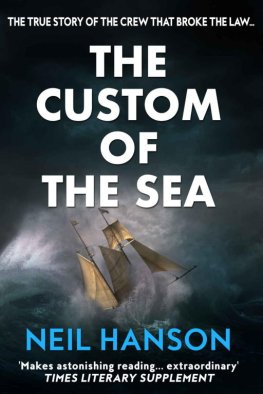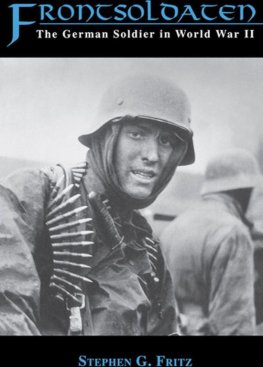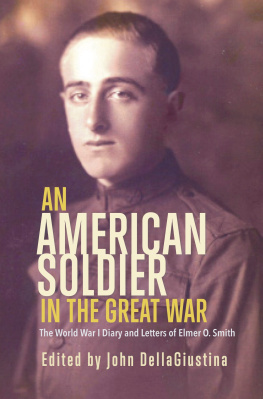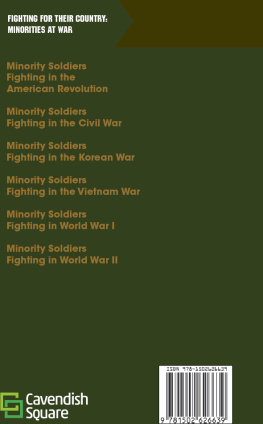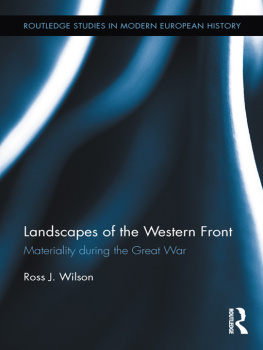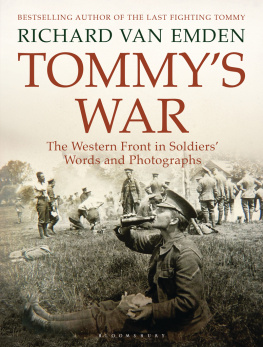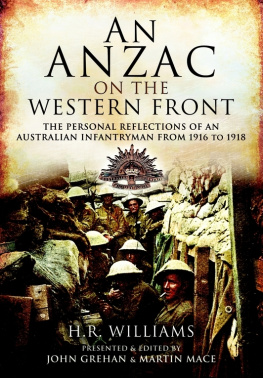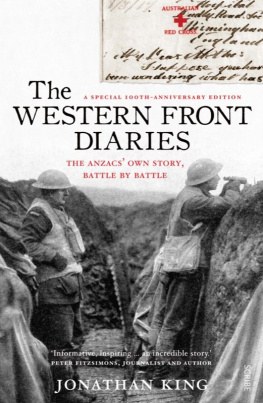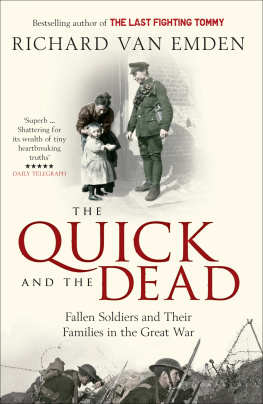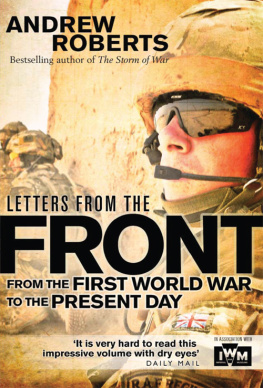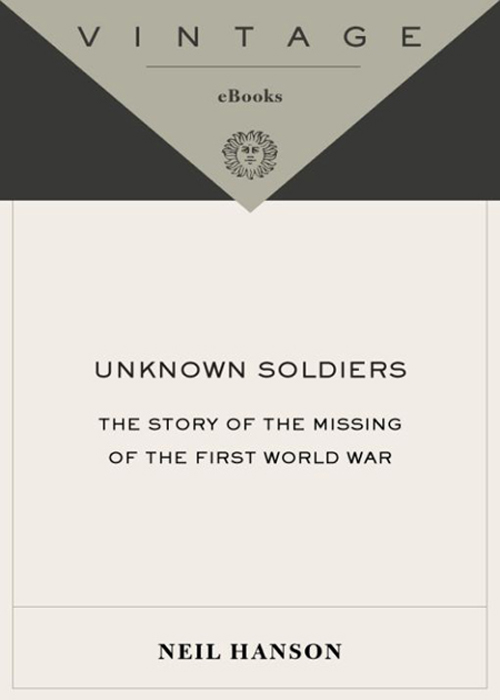
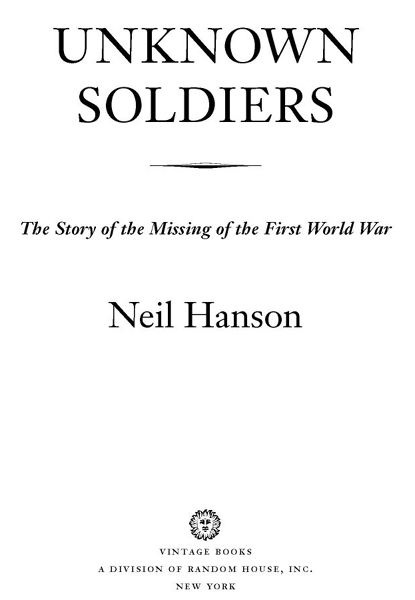
Table of Contents
In memory of Roger Goodman, 19332005,
another brave fighter
Farewell. You have known all the others who have been dear to me and youwill say goodbye to them for me. And so, in imagination, I extinguish thelamp of my existence on the eve of this terrible battle. I cut myself out of thecircle of which I have formed a beloved part. The gap which I leave must beclosed; the human chain must be unbroken. I, who once formed a small linkin it, bless it for all eternity. And till your last days, remember me, I begyou, with tender love. Honour my memory without gilding it, and cherishme in your loving, faithful hearts.
Letter written by German soldier Otto Heinebach, the night before he was killed
Praise for Neil Hansons
UNKNOWN SOLDIERS
In Neil Hansons prose, the dark ceremonial of Remembrance Sunday [has] an almost unbearable poignancy.... A beautifully illustrated book that has all the somber grandeur of the Beethoven funeral march.
The Sunday Times (London)
The books that are read most widely are... the ones that allow families to see the way the war invaded every household and left traces and wounds palpable to this day. This is the register of Unknown Soldiers, Neil Hansons account of British and German families trying to cope with the loss of sons who had no known grave.
The Times Literary Supplement (London)
Hanson builds on the experience of his three warriors to put WWI in haunting perspective. Their touching letters make you wonder: Will any future historian ever be able to put the same personal touch on what Americans in Iraq experienced?
St. Louis Post-Dispatch
One of the best books... on the insanity of life in the trenches.
Daily Mail (London)
Hanson reconstructs these ordinarily extraordinary biographies. He shows us not only just how these young lives were abbreviated in the abyss of trench warfare, but how their peoplefamily as well as nationcame to terms with their loss.
The New York Sun
[The book] is among the most memorable... in over thirty years of reading, teaching and writing about that disaster. And that includes Henry Williamson, Siegfried Sassoon, Robert Graves and a dozen other immortals. [Hanson] writes with passion, as anyone should who ventures into this appalling subject, but his passion is restrainedand therefore doubly effectiveby the quality of his scholarship and by his exceptional gift as a writer.
The Press (New Zealand)
Hanson has written perhaps one of the most terrifying, moving and ultimately melancholic histories of the soldiers of the Great War. Through Homeric research into personal letters, diaries and official documents... this book commemorates their sacrifice in an unforgettable way.
The Decatur Daily
Hanson writes learnedly, vividly and often in a moving way about a war that continues to haunt us.
The Age (Australia)
The story of the Unknown Soldier is itself a fascinating one, revealing the enormous impact the losses of the Great War had on the fabric of Britain.... Hanson tells the story fully and well (and) puts flesh on the bones of the Unknown Soldier in the life-and-death stories of his three protagonists.
Literary Review (London)
Hanson focuses on three such unknown soldiers.... He follows them into battle and to their deaths, then describes their families struggle with heartbreaking loss. It was a time when common people recorded their feelings with uncommon eloquence (the epigraph, from a letter written by a German soldier the night before he died, is one of the bravest goodbyes youll ever read), and grief was deep and private.
The Arizona Republic
Hanson has taken the lives of three soldiers... and with the help of some terrific original research, fashioned not only an almost uniquely compelling narrative of the conflict from the point of view of the soldiers who fought it, but also an exploration of the complex aftermath and the emotional reception the troops got on their return.... A sobering call away from arms... it is almost impossible to finish the book without tears in your eyes.
The Daily Telegraph (London)
Acknowledgments

My grateful thanks to the families of my three chosen unknown soldiers who have generously shared their memories and their family papers with me: Doug Goodman, Diana Goodman and the late Roger Goodman; Frau Brigitte Kostka; Bing and Nancy Seibold, Teddy Westlake and Grace Bambi Williams.
I am also grateful for the generous help of the following individuals and organisations: The American Aviation Historical Society; Debra K. Bade, Editor, News Research and Archives, Chicago Tribune; Ione Bates; Dick Bennett, President, the League of WWI Aviation Historians; Lorraine Brochu, University of Chicago; Dr. Erik Carlson of the McDermott Library at the University of Texas at Dallas; Bob Clarke; Richard Davies, Chris Sheppard and the staff at Special Collections, Brotherton Library, University of Leeds; Philippa Donovan; Jane Estevez; the late Pat Evans; Holly Fenelon; Andrew George, Principal District Archivist, West Yorkshire Archive Service; the Rev. Dr. Neil W. Gerdes, Chicago Historical Society; Patricia Gnadt, Illinois; Paul Goodman; Phil Jarrett; Margaret Johnson; Jill Knight; Christian Kuhrt; Donna Ludlow at the Arkansas Historical Association; Franz Moegle-Hofacker and Judith Bolsinger at the Hauptstaatsarchiv Stuttgart; the Newberry Library, Chicago; Tim OGorman, Director of the Quartermaster Museum; Bob Pearson at internetmodeler.com; Holly Reed at the National Archives in Washington; Marvin Skelton, Jen Stebbing, Press and Communications Officer, and Dr. Tony Trowles, Librarian, of Westminster Abbey; John Thirlwell; Paul Tilston; Oscar Villalon of the San Francisco Chronicle; Simon Wilkinson at SWpix; David Wyka, University of Chicago, and the always helpful staff of the American Military History Institute; the British Library; the Brotherton Library, University of Leeds; the Chicago Public Library; the Imperial War Museum Reading Room; the London Library; the National Archives, Kew; the New York Public Library; the Muniment Room and Library at Westminster Abbey; and the many other archives and collections listed in the bibliography.
My thanks, as ever, to Ash Green, Luba Ostashevsky, Andrew Miller, and all the other members of the team at Knopf, Maria Massey, Soonyoung Kwon, and Christine Casaccio; to Kim Witherspoon and David Forrer at Inkwell Management in New York; and above all, to Lynn, Jack and Drew, without whom no books would be written and no books would be worth writing.
Introduction

At noon and four-thirty in the afternoon, today and every day, the plaintive wail of warning sirens echoes over the plains of Flanders and northeast France. There is a momentary silence and then the thunderous blast of explosions as piles of munitions, newly unearthed from the former battlefields, are destroyed, an echo of the Great War which has continued to reverberate for eighty years. There is also an annual harvest of up to a quarter of a million kilos of scrap metal: shrapnel, shell casings, spent bullets, steel helmets, barbed wire, entrenching tools, buckles, buttons and all the other detritus of trench warfare.
Next page

